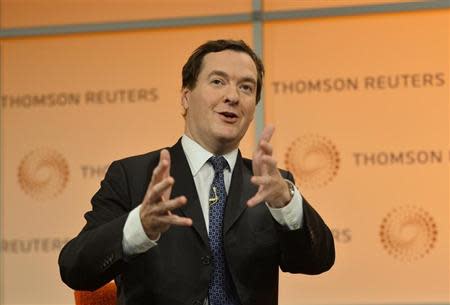UK's Osborne says vindicated by growth rebound, vows to stay on course

By David Milliken and William Schomberg LONDON (Reuters) - Finance minister George Osborne celebrated a sharp turnaround in Britain's economy as vindication of his austerity push on Thursday, but said he would not relax his grip on public spending in the years ahead. Obsorne used a big jump in forecasts for growth in 2013 and 2014 to taunt the opposition Labour party ahead of a general election in 17 months' time. "We have held our nerve while those - who predicted there would be no growth until we turned the spending taps back on - have been proved comprehensively wrong," he told parliament as he gave a half-yearly update on the government's economic plans. As recently as April, Osborne was under heavy criticism from Labour for not doing more to spur a flat-lining economy. The International Monetary Fund also urged him to speed up spending. But a sudden pickup in growth has made Britain one of the fastest-growing advanced economies - the euro zone is set to grow at less than half the rate of Britain next year, according to European Central Bank projections released on Thursday. It also means the government's goal of fixing the public finances is no longer slipping further out of reach and Osborne announced the first big fall in projected public borrowing since the coalition took power in 2010. Labour is now campaigning on what it calls a cost of living crisis, saying low wage growth and surging fuel and transport bills have left many Britons worse off, something Osborne tried to deflect with a freeze on fuel duty and other measures. Borrowing - excluding the effect of cash transfers from Royal Mail and the Bank of England - was revised down to 6.8 percent of gross domestic product in the current fiscal year, from March's estimate of 7.5 percent. The deficit, by that measure, would be wiped out by the 2018/19 fiscal year. But, based on another measure of Britain's over-spending which Osborne originally used as a target for his austerity program, the deficit was due to take a year longer than previously forecast to return to surplus. Looking further ahead, Osborne said he would send to parliament next year a fiscal charter to bind future governments to bring down public debt, something that could pressure Labour to back the policy or risk accusations of irresponsibility. GROWTH FORECASTS RAISED Osborne said forecasts from Britain's budget watchdog, the Office for Budget Responsibility (OBR), showed economic growth in 2013 was expected to be 1.4 percent, rising to 2.4 percent in 2014. That represented a big upgrade from the OBR's predictions in March of growth of 0.6 percent and 1.8 percent respectively. However, the economy remains smaller than before the financial crisis and Osborne stressed that Britain faced more spending cuts in the years ahead to rebalance its public finances and restore the economy to health. "Britain's economic plan is working. But the job is not done," he said, noting the structural budget deficit - which is not helped by a pickup in the economy - was not expected to fall any faster than previously forecast. The updated economic forecasts were mostly in line with economists' expectations. Capital Economics said they were cautious and if growth was stronger, Osborne might be able to announce some modest tax cuts before the next election. Alan Clarke at Scotiabank said an earlier and lower peak in the national debt than previously forecast could see Britain regain triple-A credit ratings. Standard & Poor's is the only one of the three main agencies to still have Britain on the top rating after Moody's and Fitch took the UK down a notch this year. Moody's, however, said later on Thursday that Britain's "ongoing fiscal challenges" meant it was not thinking about upgrading the rating any time soon. The economic rebound and government measures to promote property purchases have helped push up property prices. In a reflection of concerns about a price bubble in London's property market, Osborne announced the introduction of capital gains tax for foreigners who own a British property which is not their primary residence. Labour, which is ahead in the polls, reiterated the party's criticism that while economic data is improving many Britons are not benefiting. "For all their complacent boasts, after three damaging and wasted years, for most people ... there is still no recovery at all," Ed Balls, Labour's top economics official, told parliament. "The whole country will have seen today that for all his boasts and utterly breathtaking complacency, the Chancellor (finance minister George Osborne) is in complete denial." The government sought to show voters it can help offset the impact of stubborn inflation which has eaten into their wages for several years. Osborne said more children would get free school meals and married couples would get tax breaks. Businesses would benefit from a cap on property tax increases and companies hiring people under the age of 21 would no longer have to pay payroll taxes. (Additional reporting by Christina Fincher, Silvia Antonioli, William James and the UK bureau, editing by Susan Fenton)
